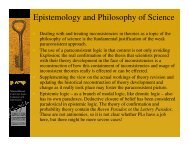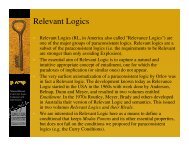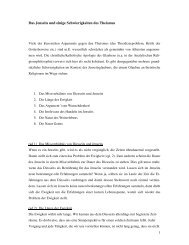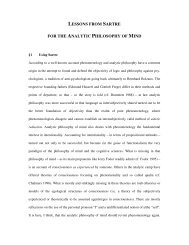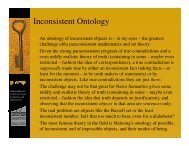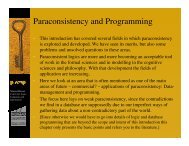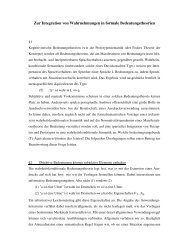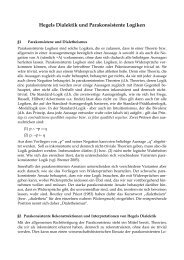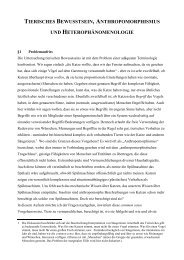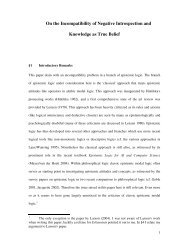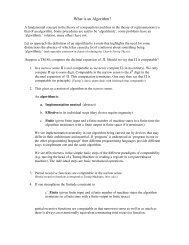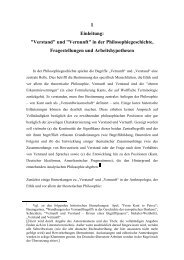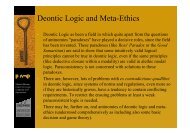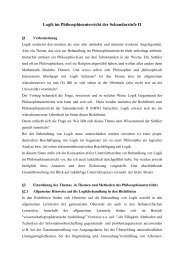Situation Semantics - Mbph.de
Situation Semantics - Mbph.de
Situation Semantics - Mbph.de
You also want an ePaper? Increase the reach of your titles
YUMPU automatically turns print PDFs into web optimized ePapers that Google loves.
Centre for<br />
the<br />
Study of<br />
Logic,<br />
Language, and<br />
<strong>Situation</strong> <strong>Semantics</strong><br />
Introduced in the early 80s by Jon Barwise<br />
& John Perry.<br />
Originally motivated as realistic approach to<br />
a semantics of propositional attitu<strong>de</strong>s.<br />
Developed by Keith Devlin as a theory of<br />
information (units).<br />
Developed into a formal mo<strong>de</strong>l of information<br />
flow by Jon Barwise & Jerry Seligman.<br />
Manuel Bremer
Centre for<br />
the<br />
Study of<br />
Logic,<br />
Language, and<br />
Bringing Ontology Back Into<br />
Information Theory<br />
The theories consi<strong>de</strong>red so far were<br />
syntactic, semantic or were concerned with<br />
epistemic properties of information.<br />
<strong>Situation</strong> semantic´s slogan was „bringing<br />
ontology back to semantics“: <strong>de</strong>finitions<br />
and explanations are based on a plethora of<br />
ontological categories.<br />
This applies to a analysis of information in<br />
terms of situation semantics as well.<br />
Manuel Bremer
Centre for<br />
the<br />
Study of<br />
Logic,<br />
Language, and<br />
Basic Ontology<br />
The basic ontology inclu<strong>de</strong>s:<br />
- individuals, <strong>de</strong>noted by a, b, c…<br />
- relations, <strong>de</strong>noted by P, Q, R…<br />
- spatial locations, <strong>de</strong>noted by l, l´, l´´…<br />
- temporal locations, <strong>de</strong>noted by t, t´, t´´<br />
- situations, <strong>de</strong>noted by s, s´, s´´…<br />
- truth values: 1 (true) and 0 (false)<br />
Manuel Bremer
Centre for<br />
the<br />
Study of<br />
Logic,<br />
Language, and<br />
A Note on <strong>Situation</strong>s<br />
<strong>Situation</strong>s are of course central to situation<br />
semantics – but what is a situation?<br />
Are situations abstract or concrete entities?<br />
The most important feature of situations is:<br />
they are partial (not total as possible worlds)<br />
<strong>Situation</strong> semanticists speak of “situations”,<br />
“abstract situations”, “situation types”,<br />
“facts”, “propositions” and “infones”!<br />
Manuel Bremer
Centre for<br />
the<br />
Study of<br />
Logic,<br />
Language, and<br />
<strong>Situation</strong>s Are Parts of Reality<br />
(the Universe)<br />
Here we take (following Devlin in some of<br />
his remarks) situations as concrete entities.<br />
Peter´s clock is white in Trento, 8/5/2002 at 8 a.m.<br />
is a situation.<br />
If you take a part of the universe you have a<br />
situation s (involving some individuals,<br />
relations and location), s being partial.<br />
“abstract situation” etc. are constructed then<br />
Manuel Bremer
Centre for<br />
the<br />
Study of<br />
Logic,<br />
Language, and<br />
Types<br />
To introduce more complex entities we<br />
need some more basic categories:<br />
- types: for each object of the theory there is<br />
at least one type which it is an object of.<br />
basic types are:<br />
TIM: the type of temporal locations (resp. LOC)<br />
IND: the type of an individual<br />
SIT: the type of a situation<br />
RELn : the type of an n-place relation<br />
Manuel Bremer
Centre for<br />
the<br />
Study of<br />
Logic,<br />
Language, and<br />
Parameters<br />
- parameters: for each basic type there is an<br />
infinte collection of basic parameters.<br />
a* is parameter for individuals<br />
s* is a parameter for situations<br />
t* is a parameter for a time region etc.<br />
We write “x:T” to say that x is of type T.<br />
Given parameters we can introduce more types by type abstraction:<br />
[x*| s |= I] , the type of those x for which situation s supports the infons<br />
in the set of infons I (in which infons contain a parameter x*).<br />
Manuel Bremer
Centre for<br />
the<br />
Study of<br />
Logic,<br />
Language, and<br />
Parameters Anchored<br />
Parameters work like variables: they can be<br />
anchored to objects of their type.<br />
An anchor for a set A of basic parameters is<br />
a function <strong>de</strong>fined on A which assigns to<br />
each parameter T n in A an object of Type T.<br />
If γ is a (compound) infon –to be <strong>de</strong>fined next– and ƒ an anchor for<br />
some parameter in γ, γ[ƒ] <strong>de</strong>notes the infon resulting from replacing<br />
each parameter a* in dom(ƒ) by ƒ(a*). (Compare interpreting variables<br />
in a formula.) Given a condition ϕ, a*| ϕ is a restricted parameter,<br />
open only to be anchored to objects that fulfil the condition ϕ. (A<br />
condition being a conjunction of infons.)<br />
Manuel Bremer
Centre for<br />
the<br />
Study of<br />
Logic,<br />
Language, and<br />
Derived Ontology<br />
Taking our primitive categories we <strong>de</strong>fine:<br />
- infons: <br />
A simple infon says that some objects stand<br />
in some relation or don´t.<br />
- propositions: s |= φ<br />
An infon φ “is ma<strong>de</strong> factual” by s. s is a real<br />
situation which is like φ says. s supports φ.<br />
So information is always about a situation.<br />
Manuel Bremer
Centre for<br />
the<br />
Study of<br />
Logic,<br />
Language, and<br />
Infon Logic<br />
Compound infons are <strong>de</strong>fined by closing<br />
infons un<strong>de</strong>r conjunction, disjunction, and<br />
boun<strong>de</strong>d quantification (over parameters):<br />
ϕ∧σ, for example, is a compound infon.<br />
For any s: s|= ϕ∧σiff s|= ϕ and s|= σ<br />
For any s: s|= ϕ∨σiff s|= ϕ or s|= σ<br />
If ϕ is an infon that involves the parameter x* and A is some set of<br />
objects, then (∃x* ∈ A) ϕ is a compound infon. So for a situation that<br />
contains the member of A: s|= (∃x* ∈ A) ϕ iff there is an anchor ƒ of<br />
x* to an element of A, such that s|= ϕ[ƒ]. (accordingly for (∀x* ∈ A))<br />
Note: infons are not closed un<strong>de</strong>r negation!<br />
Manuel Bremer
Centre for<br />
the<br />
Study of<br />
Logic,<br />
Language, and<br />
A Note on Infons<br />
Infons were introduced into situation<br />
semantics by Devlin. They correspond to<br />
what Barwise & Perry –most of the time–<br />
call “situations”.<br />
Note that infons are something like or<strong>de</strong>red<br />
tuples, which means that an infon really<br />
contains the entities which make it up.<br />
We like infons, since we`re after information<br />
and information flow.<br />
Manuel Bremer
Centre for<br />
the<br />
Study of<br />
Logic,<br />
Language, and<br />
Infons and Language<br />
Infons are no linguistic entities. Sometimes<br />
some expressions are mentioned in an infon,<br />
but only just like objects are parts of infons.<br />
The theory of information presented is<br />
therefore in<strong>de</strong>pen<strong>de</strong>nt of language and a<br />
specific coding scheme! (Which is the opposite<br />
in the syntactic and possible worlds<br />
approach, which is relative to some Li.) Manuel Bremer
Centre for<br />
the<br />
Study of<br />
Logic,<br />
Language, and<br />
Infons, <strong>Situation</strong>s and Facts<br />
We said situations are concrete entities, so<br />
situations can be contained in infons, e.g.<br />
<br />
David sees situation s´ (say a football<br />
match) at time t´ in location l´.<br />
(Since situations support infons this embedding of situations in infons<br />
might lead to semantic paradoxes, but we don´t care here now.)<br />
We can say that infon σ is a fact iff the<br />
world is as σ says. For a real s, s|= σ<br />
Manuel Bremer
Centre for<br />
the<br />
Study of<br />
Logic,<br />
Language, and<br />
Fine Grained Information<br />
The ontological approach allows for more<br />
fine grained information content.<br />
The syntactic approach only very indirectly<br />
(by the <strong>de</strong>finition of the coding scheme)<br />
talks about semantic content at all. The<br />
possible worlds approach gives the same<br />
information content to all contingent<br />
statements (in case of an a priori measure)!<br />
Manuel Bremer
Centre for<br />
the<br />
Study of<br />
Logic,<br />
Language, and<br />
Fine Grained Information (II)<br />
Given an approach that bases information<br />
on the structure of information bearing<br />
entities you can make finer distinctions:<br />
The infon i 1<br />
<br />
has another information content as i 2<br />
<br />
since the one involves Peter and the other<br />
involves Helga.<br />
Manuel Bremer
Centre for<br />
the<br />
Study of<br />
Logic,<br />
Language, and<br />
Derived Ontology (II)<br />
Abstract situations: {σ | s|= σ}<br />
An abstract situation is <strong>de</strong>fined as the set of<br />
infons that are ma<strong>de</strong> real by a situation of<br />
that kind. Not all abstract situations are<br />
instantiated (e.g., might be inconsistent).<br />
<strong>Situation</strong> types: [s* | s*|= σ]<br />
having the same purpose.<br />
Example: [s* | s*|= <br />
the type of situation where some individual in running in l´ at t´.<br />
Manuel Bremer
Centre for<br />
the<br />
Study of<br />
Logic,<br />
Language, and<br />
Abstract <strong>Situation</strong>s<br />
The relation of support can be applied to<br />
abstract situations: Let s be an abstract<br />
situation, now we have: s|= σ iff σ∈s.<br />
Relative to abstract situations we can now<br />
explain what it means that one real situation<br />
is part of another real situation:<br />
Let s 1a , s 2a be the abstract situations that contain all infons<br />
supported by the situations s 1 and s 2 ,<br />
s 1 is part of s 2 iff s 1a ⊆ s 2a .<br />
Manuel Bremer
Centre for<br />
the<br />
Study of<br />
Logic,<br />
Language, and<br />
Events<br />
Space (time) regions have basic relations<br />
l ° l´ , l overlaps l´ (in space)<br />
l ~ l´ , l prece<strong>de</strong>s l´ (resp. t ~ t´)<br />
t @ t´ , t overlaps t´ (in time)<br />
A course of events is a partial function from<br />
the product of space and time regions into<br />
situation types with space and time parameters.<br />
It tells a partial history of the universe.<br />
(A minimal one changes one situation into another.)<br />
Manuel Bremer
Centre for<br />
the<br />
Study of<br />
Logic,<br />
Language, and<br />
Partiality<br />
Note: courses of events are not total (they<br />
aren`t negation complete world histories<br />
like in some modal logics).<br />
<strong>Situation</strong> semantics argues that it is<br />
sufficient and fruitful to start with partial<br />
<strong>de</strong>scriptions or partial information.<br />
Note: s|≠ does not imply s|=.<br />
<strong>Situation</strong>s supporting infons (propositions)<br />
are not negation complete.<br />
Manuel Bremer
Centre for<br />
the<br />
Study of<br />
Logic,<br />
Language, and<br />
Getting Information<br />
To mo<strong>de</strong>l information flow we need a<br />
cognitive system.<br />
That is an object that is able to know:<br />
- the system is able to extract digital<br />
information from analogue representations<br />
of its environment (cf. Dretske).<br />
- the system then can use its initial<br />
information to <strong>de</strong>rive more information by<br />
some mechanisms (here called constraints).<br />
Manuel Bremer
Centre for<br />
the<br />
Study of<br />
Logic,<br />
Language, and<br />
Constraints<br />
Constraints link situations. Constraints are<br />
used in situation semantics to mo<strong>de</strong>l<br />
(natural) laws, conventions, regularities.<br />
Constraints are relations between types of<br />
situations.<br />
Example: Smoke means fire.<br />
That is: If S 1 is the type of situations where smoke is present, and S 2 is<br />
the type of situations where there is fire, these situations are linked by<br />
a (natural) constraint. An agent can pick up information (that there is a<br />
situation of type S 2 ) by observing that there is a situation of type S 1 if<br />
the agent is aware of or attuned to the constraint.<br />
Manuel Bremer
Centre for<br />
the<br />
Study of<br />
Logic,<br />
Language, and<br />
Constraints (II)<br />
Constraints can be written: S´ ⇒ S´´<br />
where S´ and S´´ are situation types.<br />
Constraints are involved in meaning<br />
relations; example: “fire” means fire<br />
This is a contraint linking an utterance<br />
situation type to a type of situation where<br />
fire is present. (Attuned agents un<strong>de</strong>rstand “fire”.)<br />
The situation semantic´s account of<br />
meaning is based on constraints.<br />
Manuel Bremer
Centre for<br />
the<br />
Study of<br />
Logic,<br />
Language, and<br />
Constraints (Detailed Example)<br />
The constraints mentioned can be mo<strong>de</strong>lled:<br />
S = [s*| s*|= ]<br />
S´= [s*| s*|=]<br />
S´´ = [s*´| s*´|=∧<br />
with the two constraints<br />
(C1) S ⇒ S´ and (C2) S´´ ⇒ S´<br />
The constraints give information what other<br />
kind of situation is involved here.<br />
Any instance where a constraint is utilised<br />
making an inference about an object x*<br />
involves specific situations by anchoring.<br />
Manuel Bremer
Centre for<br />
the<br />
Study of<br />
Logic,<br />
Language, and<br />
Meaning (Example)<br />
We are not concerned with the analysis of<br />
meaning here, but to give an example of<br />
using the notion of constraint to explain<br />
sentential meaning:<br />
Let σ be the sentence “I am eating now.”<br />
The meaning of σ (||σ||) is the constraint<br />
linking the following situation types:<br />
[s´* | s´*|={, }]<br />
[s´´* | s´´*|=]<br />
(If individual a utters σ at time t that individual is eating at that time.)<br />
Manuel Bremer
Centre for<br />
the<br />
Study of<br />
Logic,<br />
Language, and<br />
Information Flow: The I<strong>de</strong>a<br />
Consi<strong>de</strong>r the contraints and situation types<br />
we just have given, say (C1) S ⇒ S´<br />
(S = [s*| s*|= ], S´= [s*| s*|=])<br />
Suppose s 1:S (situation s 1 is of type S).<br />
Being aware of the constraint (C1) we have<br />
the information that there is a situation s 2<br />
(maybe s 2 = s 1) with s 2:S´ so that s 1 and s 2<br />
are co-temporal, i.e. t* has to be anchored<br />
to the same time interval.<br />
Manuel Bremer
Centre for<br />
the<br />
Study of<br />
Logic,<br />
Language, and<br />
Information Flow: The Role of<br />
Parameters<br />
We get information about some situation<br />
given that we know a given situation is of<br />
some type and that type is linked by a<br />
constraint to some other type (of situation).<br />
The actual linking of situations is done by<br />
parameters (where a parameter present in<br />
the two situation types is anchored to an<br />
object present in the two situations linked).<br />
Manuel Bremer
Centre for<br />
the<br />
Study of<br />
Logic,<br />
Language, and<br />
Knowledge and Information<br />
To see that some infons are supported by<br />
some situation s´ given what we know about<br />
some other situation s and being aware or<br />
attuned to constraints C, C´… is to acquire<br />
knowledge (an externalist epistemology).<br />
You can acquire knowledge without being<br />
aware of it or the acquiring process.<br />
Knowledge is in<strong>de</strong>pen<strong>de</strong>nt of its mo<strong>de</strong> of<br />
representation.<br />
Manuel Bremer
Centre for<br />
the<br />
Study of<br />
Logic,<br />
Language, and<br />
Information?<br />
Then what is information after all?<br />
- The information an agent a has about a<br />
situation s is the closure of a´s representation<br />
of s un<strong>de</strong>r infon logic given the<br />
constraints that a is aware of or attuned to.<br />
- The information present in a situation is<br />
the closure of the set of infons supported by<br />
s un<strong>de</strong>r infon logic given all constraints.<br />
Information is present in the world.<br />
Manuel Bremer
Centre for<br />
the<br />
Study of<br />
Logic,<br />
Language, and<br />
Why Use <strong>Situation</strong> <strong>Semantics</strong>?<br />
Mainly an ontologically new theory: linguistic<br />
phenomena are treated as well, e.g., in<br />
categorical grammar (Montague-Grammar).<br />
Shouldn`t be consi<strong>de</strong>red psychologically real. With respect to human<br />
cognitive mechanisms: naïve and uninformed (cf. Jackendoff).<br />
But: It might mo<strong>de</strong>l one aspect of situational<br />
information flow. Information flow can<br />
be represented at such an abstract level of<br />
logical (conceptual) analysis. There we are.<br />
Manuel Bremer
Centre for<br />
the<br />
Study of<br />
Logic,<br />
Language, and<br />
Sources & Bibliography<br />
Devlin, Keith. Logic and Information.<br />
Cambridge/MA, 1991.<br />
Barwise, Jon/Perry, John. <strong>Situation</strong>s and Attitu<strong>de</strong>s.<br />
Cambridge/MA, 1983.<br />
Barwise, Jon. The <strong>Situation</strong> in Logic. Stanford,<br />
1988.<br />
Cooper, R./Mukai, K./Perry, J. (Eds.). <strong>Situation</strong><br />
Theory and Its Applications. 2 Vol. Stanford,<br />
1990.<br />
Manuel Bremer



